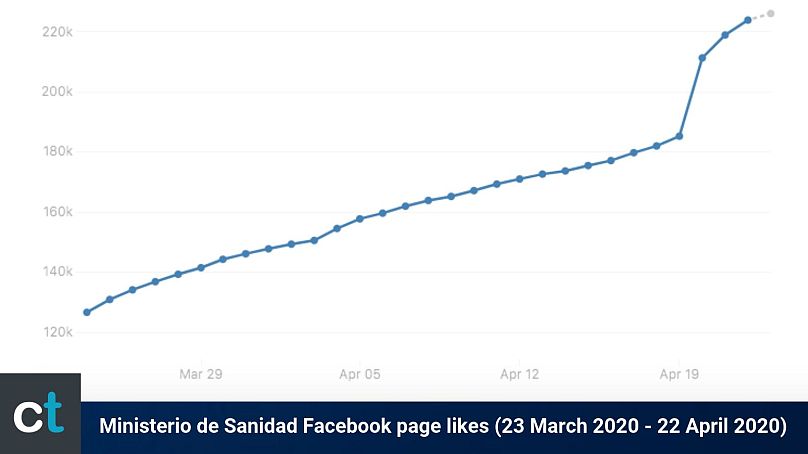The Ministry of Health claims it was a victim of "fraudulent activity" after hundreds of false profiles liked and shared their content.
Spain's government has denied it was behind a network of false Facebook accounts, which were promoting the executive's content.
An investigation by the social media giant found several bot accounts had liked and shared videos uploaded by the Spanish Ministry of Health.
By increasing the number of interactions on Facebook, false accounts were found to have broadened the Ministry of Health's content, promoting the government during the coronavirus crisis.
Prime Minister Pedro Sanchez has been under heavy fire from opponents for his coalition's handling of the COVID-19 pandemic.
The discovery of fake accounts provoked a strong reaction from opposition parties with Spain.
The conservative People's Party (Partido Popular) asked for an explanation from Pedro Sanchez, and denounced the government on Twitter.
Pablo Casado, the leader of Partido Popular, also addressed the Congress of Deputies and directly asked if the Spanish government has "launched a campaign to strengthen its online profiles".
Casado also questioned whether the executive had contracted with third parties to purchase false profiles and enhance their posts.
But the Ministry of Health released a statement denying the executive was responsible for the accounts and said they had been a "victim of fraudulent activity".
"Since last Friday 17 April, [the Ministry of Health] has been the victim of fraudulent activity by various apparently false accounts that generate massive interactions in specific publications on the official Facebook account."
The Ministry confirmed that they had informed Facebook of the "anomalous activity" on 17 April and an investigation has been launched.
"Since the beginning of the crisis, a communications team from the Ministry of Health has been working hard to disseminate information based on public service and professional videos and infographics."
There is no evidence that any official government organisation was responsible for the false profiles.
"No followers, no publications and created on the same day"
The network of bot accounts has seemingly been promoting content featuring the Spanish Minister of Health, Salvador Illa, and the Head of the Emergency Centre, Fernando Simón.
One video posted on April 18 featured a message from the government supporting the use of social distancing during the coronavirus crisis.
The video had initially received more than 26,000 reactions, significantly more than some previous uploads on the page.
An investigation into those accounts which had 'supported' the video found that many had characteristics of bot accounts.
The Ministry of Health also reported that the false accounts "had no followers, no publications and had been created on the same date."
The video currently has still received more than 22,000 reactions and 9,000 comments. Analysis using Facebook's own tool CrowdTangle shows that the content is currently performing 25 times better than expected relative to the page average.
CrowdTangle Intelligence also shows that the Ministry of Health's page received 26,000 'likes' on April 20 in a noticeable spike.
Many of the suspected profiles and the 'fake likes' have since been removed by Facebook.
"In this case, we investigated the report shared by the government and found a spike in spam and fake likes globally and have removed them," a Facebook spokesperson told Euronews.
“We continually review activity on our platform and take action if we find policy violations."
Facebook says bot activity is not unique to Spain and they are working every day to block millions of attempts to create fake accounts on their platform.
The social media giant says that a spam network seemed to have created these accounts at high frequencies, which evaded their automatic detection system.
A Facebook investigation into the spam network is ongoing.
Spanish political parties have previously been accused of using social media bots to boost support during election campaigns.
In September, 65 Facebook accounts and 35 Instagram accounts linked to Partido Popular were removed by Facebook for artificially promoting public opinion.
Twitter separately removed an additional 259 false accounts ahead of the 2019 November election for violating their "platform manipulation" policies.












